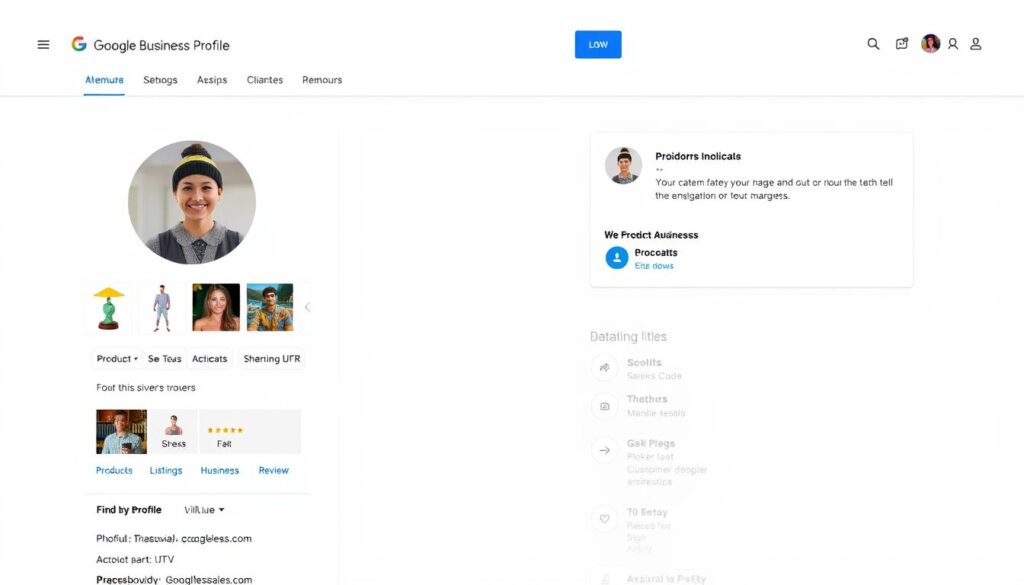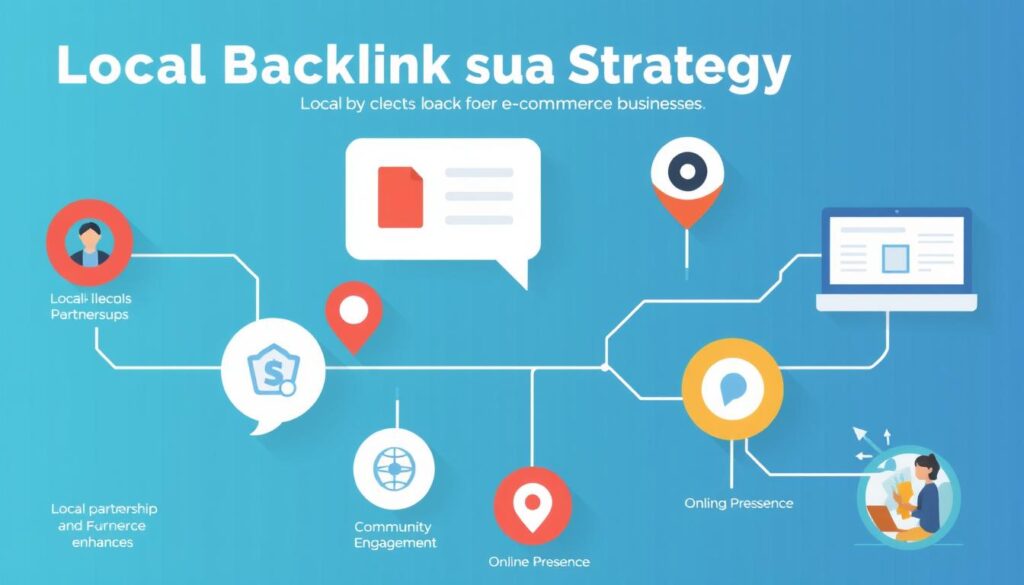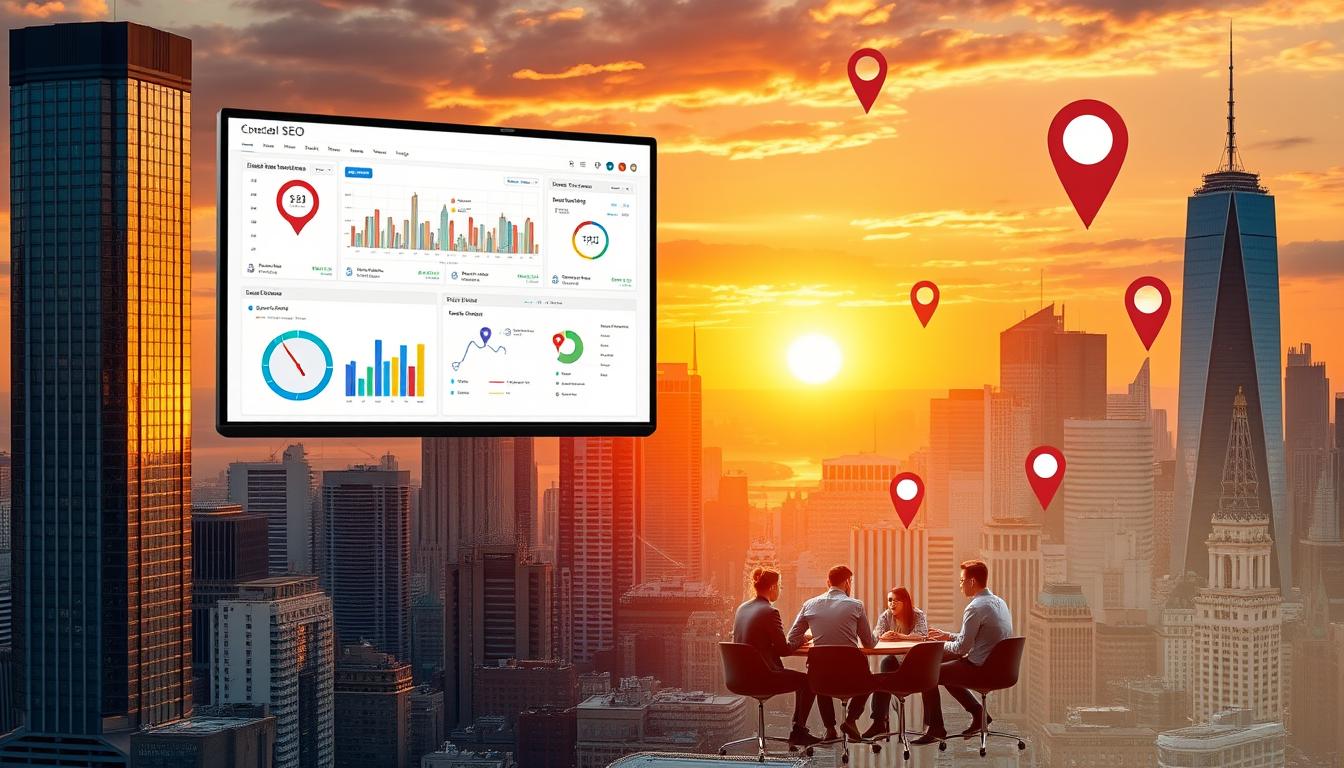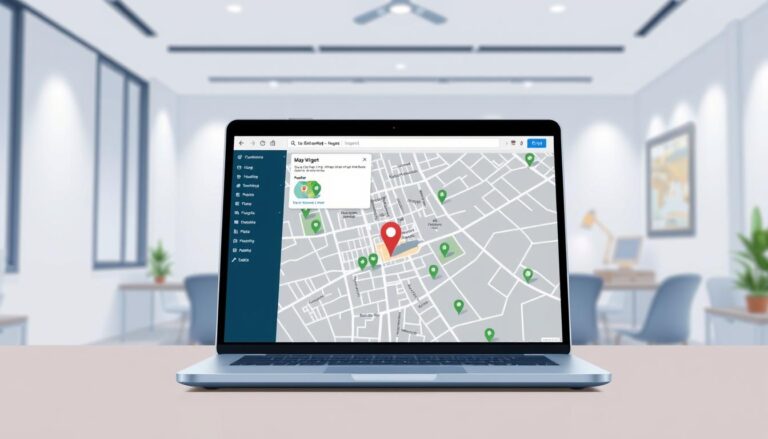As an e-commerce business owner, you understand the importance of being visible to potential customers. With nearly half of all searches having local intent, it’s crucial to optimize your online store for local search. I will guide you through the process of improving your local search presence and attracting more customers.
By implementing a solid SEO strategy, you can increase your website’s visibility, drive more traffic, and ultimately boost sales. I’ll explain how local SEO differs from traditional SEO and why it’s vital for e-commerce businesses operating in competitive markets.
Key Takeaways
- Understand the importance of local SEO for e-commerce businesses
- Learn how to improve your local search presence
- Discover the key components of a successful local SEO strategy
- Find out how to drive more traffic to your website
- Boost sales by optimizing your online store for local search
Understanding Local SEO for E-commerce
As an e-commerce business owner, understanding the nuances of local SEO can be a game-changer for your online store’s visibility. Local SEO targets the visibility of your online store in local search results, increasing your chances of being seen by consumers within your area.

Local SEO is crucial for e-commerce businesses that operate physical outlets, provide delivery services to specific regions, or function in highly competitive markets. By optimizing for local search, you can attract customers who are searching for products or services like yours in their area.
What Makes Local SEO Different for Online Stores
Local SEO differs from traditional SEO in that it focuses on optimizing your online presence to attract local customers. This means using location-specific keywords, creating content that resonates with local audiences, and ensuring your website is optimized for searches with local intent.
For e-commerce businesses, local SEO involves more than just including your city or state in your keywords. It requires a comprehensive strategy that includes optimizing your Google Business Profile, building local citations, and creating content that speaks to local customers.
Why Local SEO Matters for US & UK Markets
The US and UK markets present unique challenges and opportunities for e-commerce businesses implementing local SEO strategies. Consumer behavior differs between these markets, and understanding these differences is crucial for developing an effective local SEO approach.
In both markets, local SEO can help e-commerce businesses bridge the gap between online visibility and physical store visits, creating a seamless omnichannel experience for customers. By leveraging local SEO, businesses can increase their online presence, drive more foot traffic to their physical stores, and ultimately boost sales.
The Impact of Local SEO on E-commerce Success
The impact of local SEO on e-commerce success is multifaceted, influencing various aspects of online business. By optimizing for local search, e-commerce businesses can significantly enhance their online presence and drive more sales.

Increasing Website Traffic and Visibility
Effective local SEO strategies can increase website traffic by targeting users searching for products in specific geographic locations. This targeted approach ensures that your business reaches potential customers who are more likely to convert. As a result, your website visibility improves, leading to higher search engine rankings.
Driving Physical Store Visits Through Online Presence
A strong local online presence can drive physical store visits, creating valuable opportunities for cross-selling and upselling. When customers find your business online, they’re more likely to visit your store, increasing foot traffic and potential sales. This synergy between online and offline channels is crucial for business growth.
Building Trust with Local Customers
Appearing in local search results builds credibility and trust with potential customers. By leveraging local SEO, you can establish your business as a trusted brand in your area, making it more likely for customers to choose you over competitors. This trust is essential for long-term business success and customer loyalty.
By implementing effective local SEO strategies, e-commerce businesses can improve local visibility, drive more traffic, and increase sales. It’s a crucial aspect of any e-commerce strategy, especially for businesses targeting the US and UK markets.
How Google Ranks Local E-commerce Businesses
Cracking the code of Google’s local search rankings can significantly boost your e-commerce business’s online presence. Google uses a complex algorithm to determine the search results for specific queries or keywords. When performing a local search on Google, there are three main components that Google considers.
Relevance: Matching User Search Intent
Relevance is the first key factor in Google’s local search algorithm. It’s about ensuring that your content matches the user’s search intent. To achieve this, you need to understand what your target audience is searching for and create content that is relevant to their queries. For both US and UK audiences, this means using language and terminology that resonates with them.
For instance, if a user searches for “buy shoes online,” your e-commerce website should have content that is relevant to this query, such as product pages for shoes with clear calls-to-action. I’ll explore strategies for ensuring your content matches user search intent in more detail.
Prominence: Standing Out from Competitors
The second factor is Prominence, which refers to how well-known and trustworthy your business is. Google assesses your business’s prominence based on various signals, including reviews, ratings, and your overall online presence. To stand out from competitors, you need to build a strong brand reputation and ensure that your business information is accurate and consistent across the web.
This can be achieved by encouraging customers to leave reviews, responding promptly to feedback, and maintaining a robust online presence through social media and other channels.
Proximity: Targeting Customers in Your Area
Proximity is the third key factor, which considers the physical distance between your business and the searcher. Even if you’re primarily an e-commerce business, proximity still plays a role in local search rankings. To optimize for proximity, you need to ensure that your business’s location is clearly defined and that you’re targeting customers in your area.
This can be achieved by using location-specific keywords, creating content that is relevant to your local audience, and ensuring that your Google Business Profile is up-to-date and accurate.
Optimizing Your Google Business Profile for E-commerce
Google Business Profile optimization is a game-changer for e-commerce businesses targeting local customers. By optimizing your profile, you can increase your online visibility, drive more sales, and attract local customers.

Setting Up and Verifying Your Business Listing
To start, you need to set up and verify your business listing on Google Business Profile. This involves providing accurate and up-to-date business information, such as your business name, address, and contact details. Verifying your business listing is crucial as it enhances your credibility and visibility in local search results.
Once you’ve set up your listing, you can start optimizing it with relevant information, such as your business hours, categories, and descriptions.
Adding Products and Services to Your Profile
Adding products and services to your Google Business Profile helps attract local customers searching for what you offer. You can showcase your products with high-quality images, descriptions, and prices. This feature is particularly useful for e-commerce businesses with a wide range of products.
By showcasing your products on your Google Business Profile, you can increase your online visibility and drive more sales.
Leveraging Google Business Posts and Updates
Google Business posts and updates allow you to promote special offers, new products, and events that appeal to your local target audience. You can post photos, videos, and text updates to keep your customers engaged and informed.
By leveraging Google Business posts and updates, you can increase customer engagement, drive more sales, and improve your local SEO.
Local SEO Tips for E-commerce Websites Targeting US and UK Markets
Local SEO is a vital component for e-commerce success in the US and UK, enabling businesses to reach local customers more effectively. By optimizing your online presence for local search, you can increase your visibility, drive more foot traffic to your physical stores, and ultimately boost sales.
Keyword Research for US & UK Audiences
Conducting thorough keyword research is essential to understand what your target audience is searching for in the US and UK markets. This involves identifying regional language differences and search behaviors. For instance, using terms like “online shopping” in the US and “online retail” in the UK can be more effective. Tools like Google Keyword Planner and Ahrefs can help you uncover valuable keywords that resonate with your local audience.
Creating Location-Specific Landing Pages
To target local customers effectively, creating location-specific landing pages is crucial. These pages should be tailored to different cities or regions within the US and UK, without duplicating content. Use geo-targeted keywords and content that reflects local preferences and needs. For example, a page targeting customers in New York might include content about local events or landmarks, making your products more relevant to the local audience.
Implementing Local Schema Markup
Implementing local schema markup on your e-commerce website helps search engines better understand your business location, products, and services. Using schema markup like LocalBusiness and Product can enhance your visibility in local search results. This structured data can also improve your chances of appearing in Google’s rich snippets, further increasing your online presence.
By incorporating these local SEO tips into your e-commerce strategy, you can improve your online visibility, attract more local customers, and drive sales in the competitive US and UK markets.
Building a Strong Local Backlink Strategy

A well-crafted local backlink strategy can significantly enhance an e-commerce business’s online visibility in local search results. To achieve this, it’s essential to understand the importance of backlinks from local sources and how they contribute to your business’s credibility and search engine rankings.
Getting Listed in Local Directories
One of the most effective ways to build local backlinks is by getting listed in reputable local directories. This involves identifying relevant directories specific to your business and ensuring that your business information, including your name, address, and phone number (NAP), is accurate and consistent across all listings. Directories like Trustpilot and other local business listings can significantly improve your local SEO.
Partnering with Local Influencers and Businesses
Partnering with local influencers and complementary businesses can help generate high-quality backlinks and increase your local visibility. By collaborating with local entities, you can create mutually beneficial relationships that drive traffic to your website and enhance your local SEO efforts. Local influencers can promote your business to their followers, further boosting your credibility.
Creating Locally Relevant Content
Creating content that is relevant to your local audience can naturally attract backlinks from community websites, local news outlets, and industry publications. By focusing on local topics and issues, you can establish your business as a local authority, thereby improving your chances of acquiring valuable backlinks. Locally relevant content is key to attracting local backlinks.
To measure the success of your local backlink strategy, it’s crucial to track your search rankings and website traffic. Utilize tools like Google Analytics and SEMrush to monitor the impact of your efforts and adjust your strategy accordingly.
Leveraging Customer Reviews for Local SEO Success
For e-commerce businesses targeting the US and UK markets, leveraging customer reviews is key to local SEO success. Customer reviews are not just a reflection of customer satisfaction; they are a critical component of how search engines rank businesses locally.
Encouraging Customers to Leave Reviews
To maximize the benefits of customer reviews, e-commerce businesses must encourage their customers to leave reviews on various platforms, including Google Business Profile, Trustpilot, and industry-specific review sites. This can be achieved by requesting reviews through email campaigns, text messaging, or social media. Additionally, placing QR codes on receipts, flyers, or other marketing materials that link directly to the review page can significantly increase review volume.
Responding to Reviews Effectively
Responding to customer reviews is crucial for maintaining a positive online reputation. Businesses should respond promptly to both positive and negative reviews, demonstrating excellent customer service and a commitment to customer satisfaction. This not only enhances the business’s reputation but also shows potential customers that the business values feedback.
Using Review Insights to Improve Your Business
Customer reviews provide valuable insights into the customer experience, highlighting areas of strength and weakness. By analyzing these reviews, businesses can identify patterns, address recurring issues, and make meaningful improvements to their products, services, and overall customer experience. This proactive approach can lead to increased customer satisfaction and loyalty.
By effectively leveraging customer reviews, e-commerce businesses can improve their local SEO, increase website traffic, and build trust with potential customers. It’s essential to maintain a steady flow of fresh, authentic reviews to boost visibility in both US and UK markets.
Conclusion: Measuring and Maintaining Your Local SEO Success
Measuring the success of yourlocal SEOstrategy is vital for continuous improvement and achieving a positive ROI. According to a study by HubSpot, businesses that track their marketing performance are 17% more likely to see a positive return on investment. To start, it’s essential to set upGoogle AnalyticsandGoogle Search Consolefor your website. Thesetoolsprovide valuable insights into your website traffic, search rankings, and user behavior.
To effectively measure yourlocal SEOperformance, you need to track key metrics such as website traffic, search rankings, and conversion rates. UsingGoogle AnalyticsandGoogle Search Console, you can gather insights about your local search visibility and identify areas for improvement. Regularly monitoring yourSEOperformance allows you to make informed decisions about your strategy and adjust your approach as needed.
Maintaining and building upon yourlocal SEOsuccess over time requires staying current with algorithm updates and changing search behaviors in both US and UK markets. It’s also crucial to regularly audit your local SEO presence to ensure your business information remains accurate and consistent across allplatformsand directories. By adapting yourSEO strategyas your e-commerce business grows, you can scale your approach when targeting multiple locations or expanding into new markets.
By following these guidelines and leveraging the righttools, you can improve yourlocal search resultsand drive more traffic to your website, ultimately enhancing your overallbusinessperformance.










